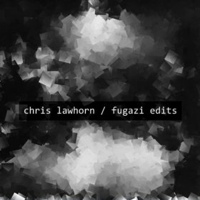
Chris Lawhorn
Fugazi Edits
Most of us have favorite bands, favorite songs. Some of us even have favorite moments within particular songs, instants in time where it feels like some sonic enlightenment is taking place. You wait for them for the first part of the song, which feels like the prelude, and when they finally arrive, you feel a sense of wonder and fulfillment, and the second part of the song is merely playing out that transcendent second. It’s rare that these moments can stand on their own. They need that prelude and playout to nurture and sustain them; by themselves, as a sample a few seconds long, it’s hard to tell what the big deal is.
All of this is an attempt to put together a context for Chris Lawhorn’s Fugazi Edits, a collection of samples taken from the discography of iconic DC band Fugazi and arranged, with no particular regard to chronology but with full approval from the band, into distinct compositions. There are 22 such arrangements of samples, none longer than two and a half minutes. Each composition is named after four Fugazi tracks from which samples are taken – for example, “Cassavetes – Latest Disgrace – Waiting Room – F-D” – which gives us a ballpark 88 songs represented. I haven’t sat down and counted how many songs Fugazi released (that’s the internet’s job), but I’d hazard to say coverage is fairly complete.
So what do all these bits and pieces sound like when put together? Like you’d expect – favorite Fugazi moments meshing together in harmony and discord, building tension and releasing it in ways you may not be familiar with. Imagine running into someone you know from your home town while visiting a foreign city, their essential character obvious, but their presence floating raw-edged in this new context, like a cardboard cutout. The flashes of near-recognition really make me take a close listen, sometimes making me lose the thread of the original song and having the pieces fall apart around me and reconfigure themselves into something new.
Not every sample is pristine, and some are quite noisy, but in Lawhorn’s hands they are made to fit together into new and interesting messages. Unlike the rash of mash-ups we saw a few years earlier, which fit ironically disparate artists together into some new “remix,” this has a focused, not-a-novelty approach. This is serious business. I’m certain Chris Lawhorn will never hear these Fugazi songs the same way again, and I don’t think I will either.
Chris Lawhorn: http://chrislawhorn.com












